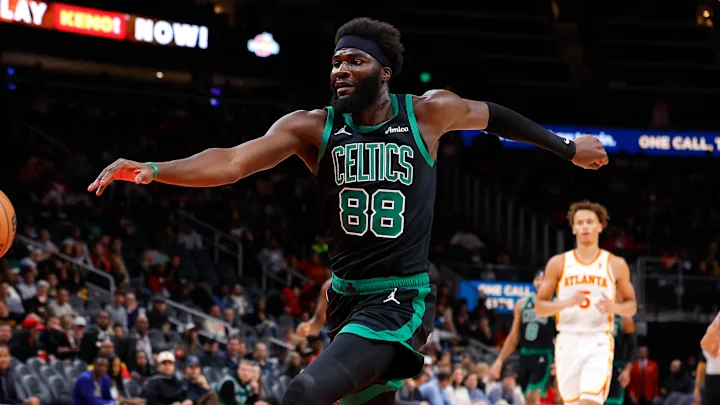
In a recent post-game interview, Boston Celtics head coach Joe Mazzulla revealed a fascinating perspective on a heated moment involving rising star Neemias Queta, explaining that the incident was actually a huge compliment to the player. This candid admission has sparked a debate among fans, analysts, and coaches alike, shedding light on Mazzulla’s unconventional approach to leadership and player development. While some applaud his bold and direct methods, others are questioning whether this type of coaching could harm team chemistry and individual player growth in the long run.
The Moment That Stood Out
The incident in question occurred during a high-stakes game, with the Celtics battling for a crucial win. Queta, a relatively new addition to the team, found himself in a tense exchange with Mazzulla on the sidelines. The moment was intense, drawing the attention of both fans in the arena and those watching the broadcast at home. Onlookers were quick to speculate about the nature of the disagreement, with some fearing a breakdown in communication or even a rift between coach and player.
However, Mazzulla, known for his intense coaching style, was quick to clarify the situation after the game. Speaking to reporters, he explained that the moment wasn’t a sign of conflict but rather a testament to his belief in Queta’s potential. Mazzulla called the interaction a huge compliment to Queta, emphasizing that he had high expectations for the young player. When I get on a guy like that, it’s because I see greatness in him,Mazzulla said. It’s a sign that I believe in him enough to push him harder, because I know he’s capable of more.
Mazzulla’s words seem to imply that his intense coaching methods are meant to motivate, rather than punish. For him, the fire and urgency on the court are part of building a culture of excellence. He wants his players to feel challenged and stretched beyond their comfort zones—after all, the NBA is not a place for mediocrity. According to Mazzulla, If you’re not getting a little uncomfortable, you’re probably not growing.
A Bold and Unconventional Approach
While Mazzulla’s explanation may sound like standard coach-speak to some, it highlights a broader trend in modern NBA coaching: the rise of the “tough-love” leadership style. Gone are the days when coaches like Phil Jackson, known for his zen approach, dominated the sidelines. Today’s NBA is full of high-pressure situations, egos, and ambitious players looking to make a name for themselves. In this environment, coaches like Mazzulla, who use intensity and directness to push players to their limits, are becoming more common.
But is Mazzulla’s approach truly effective? Or is it just a recipe for resentment and division?
Critics of this style point out that while it may work for some players—especially those with a high level of mental toughness—it could backfire with others. The NBA is filled with fragile egos, and public confrontations, even if well-intentioned, can have long-lasting effects on team dynamics. Queta, who is still developing both as a player and as a member of the Celtics’ roster, might find Mazzulla’s high expectations motivating, but other players could interpret the same treatment as alienating or counterproductive.
Furthermore, Mazzulla’s brand of coaching has faced scrutiny in light of the Celtics’ recent playoff disappointments. Though the team has shown promise, the lack of a championship under Mazzulla’s tenure has led some to question whether his methods truly translate into success on the court. Critics argue that while Mazzulla’s approach may work in the regular season, it is in the high-stakes moments of the playoffs where emotional intelligence and the ability to connect with players matter most.
The Fine Line Between Motivation and Miscommunication
The key issue here is whether Mazzulla’s methods are fostering an environment where players feel empowered and supported, or one where they feel under siege. Motivating a young player like Neemias Queta requires a delicate balance. Pushing him to be better is crucial, but so is providing him with the emotional tools he needs to handle the pressure of the NBA. This is especially important for a player who may be more sensitive to criticism and might take a public reprimand as a sign of disfavor rather than an opportunity for growth.
Interestingly, Mazzulla’s comments could be seen as part of a larger trend in coaching, where leaders are adopting a more cutthroat mentality, drawing inspiration from the hyper-competitive nature of the NBA. But in a world where mental health and player well-being are becoming increasingly important topics, one has to wonder if Mazzulla’s approach could backfire in the long run. The importance of empathy and trust-building in coaching is receiving more attention than ever before, and it remains to be seen whether Mazzulla’s tough-love style will be sustainable or if it will eventually come under fire.
Conclusion: A Compliment or a Setback?
In the end, Mazzulla’s claim that his intense coaching moment was a huge compliment to Neemias Queta is undoubtedly a reflection of his personal philosophy. Whether or not this will prove to be a successful strategy for the Celtics remains to be seen. Some fans will argue that tough coaching is necessary for success in today’s NBA, while others will point to the importance of fostering a positive, supportive environment for players’ growth. As the season progresses, it will be interesting to watch how Queta and the rest of the Celtics respond to Mazzulla’s unrelenting expectations—and whether they can transform that tension into a championship-caliber performance.






